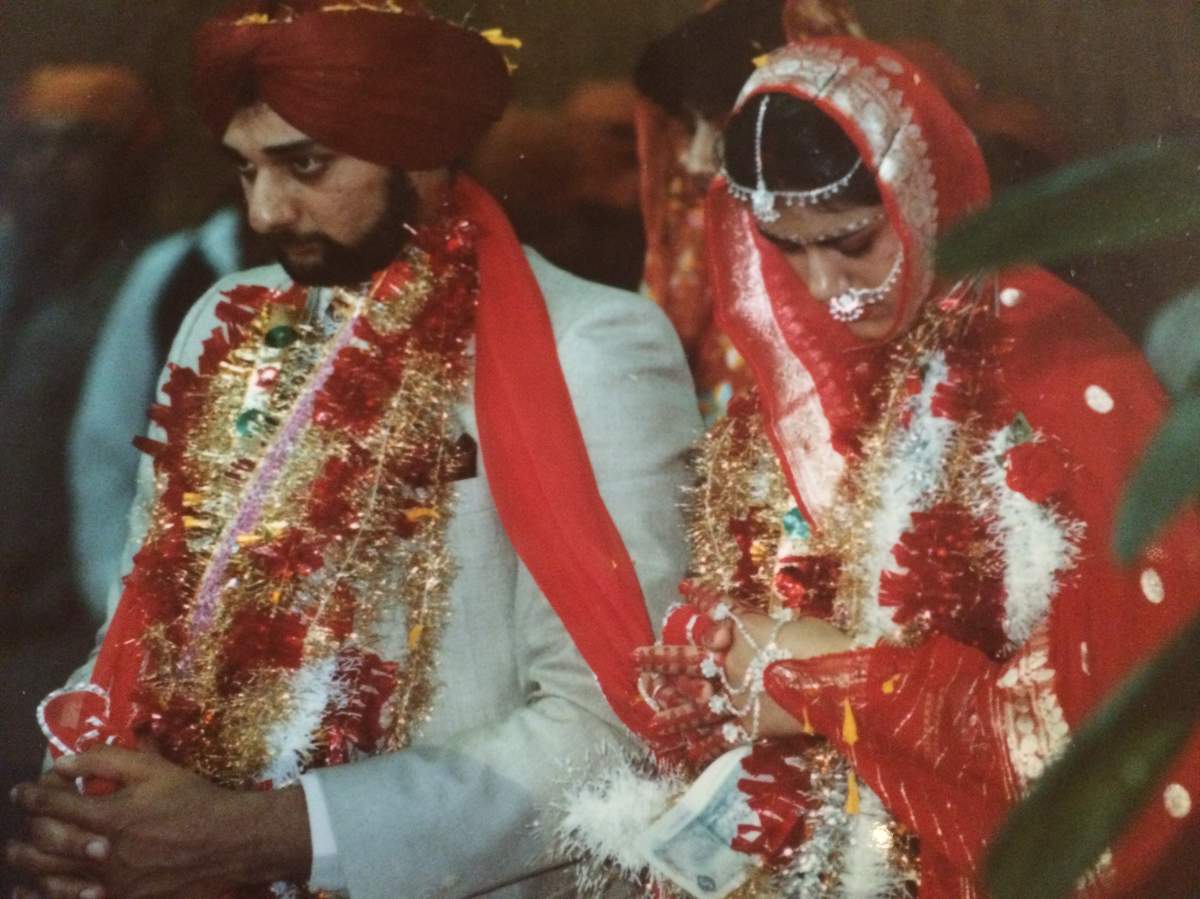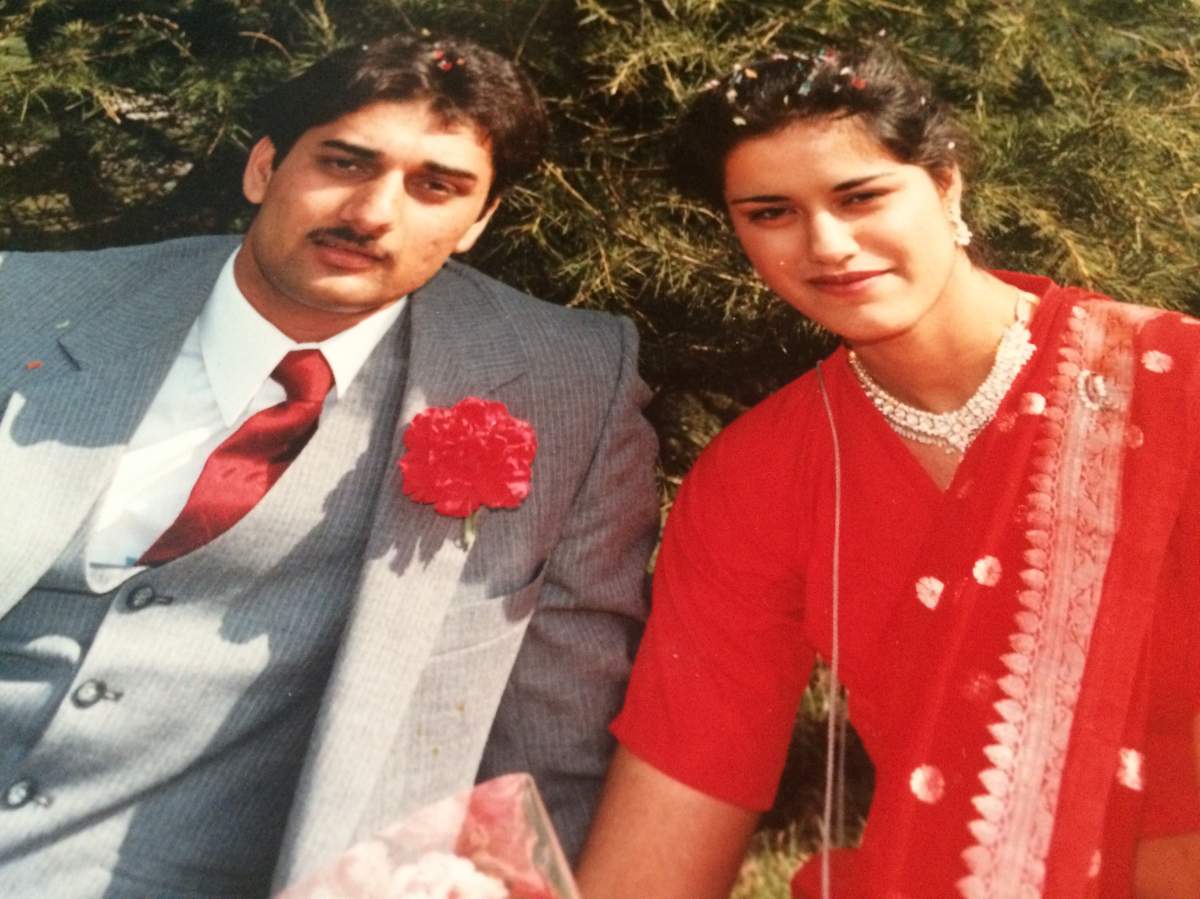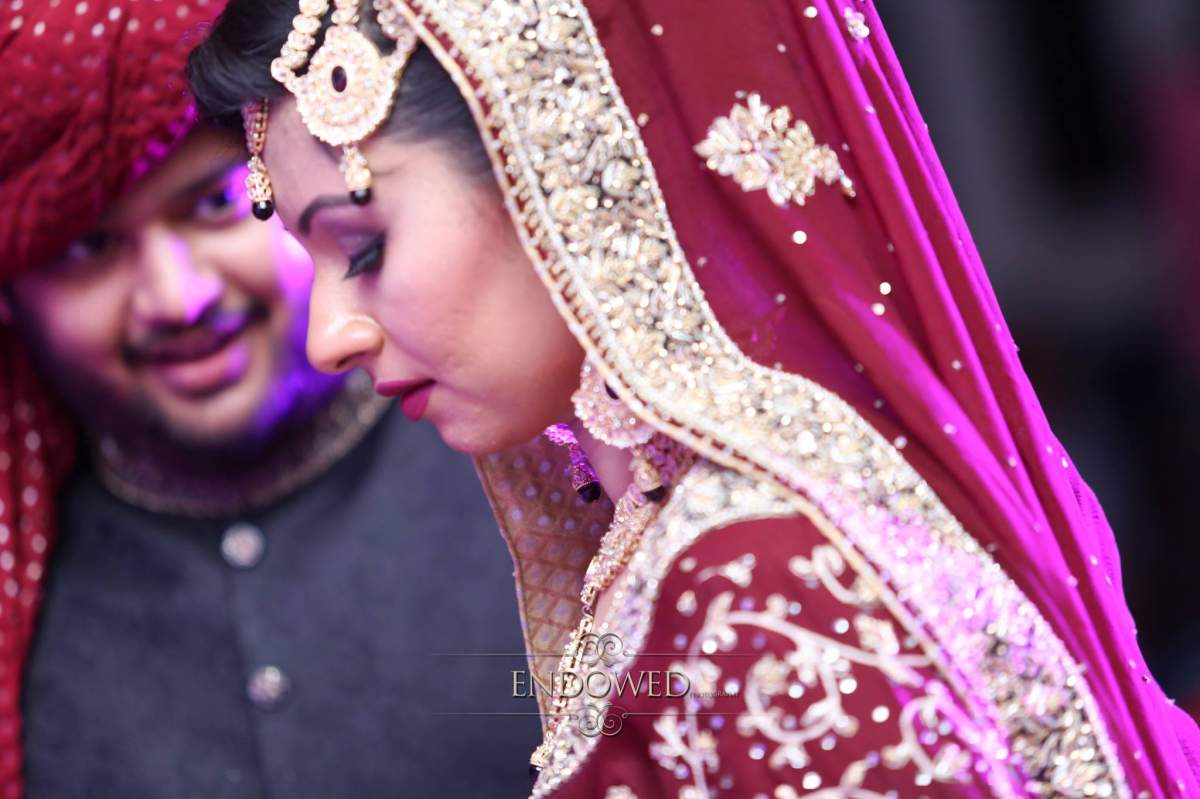This is the fourth story of a five-part series on how alternative relationships are reshaping love in Canada. Each day this week, we’re exploring a different union model, from sexless and arranged marriages to mixed orientation and polyamory. Follow along on Twitter with the hashtag #SOTUCanada.

It was April Fool’s Day 1984 when Dave Singh Gill stepped off a plane in the U.K.
His flight from Edmonton, Alta., was two hours late, and it was no joking matter. The then-24-year-old was determined to get to his destination to meet his potential wife.
Dave wanted an arranged marriage.
When he finally arrived wearing jeans, a plaid shirt and cowboy boots, Loveleen Kaur Gill says her first impression was “absolutely not.”
But then something changed.
The couple, now based in London, Ont., has been in a happy arranged marriage for 34 years. Although arranged marriages are a tradition usually associated with Asian and Middle Eastern countries, the same customs have also trickled down to communities in the U.K., Canada and the U.S.
On the surface, arranged marriages look just like any other marriage: two people in a loving, committed union sealed with a legally binding contract. But behind the scenes, they often start with introductions by family members or relatives and are finalized by the two individuals involved, giving them the ultimate choice to pick their spouse.
According to the 2016 census by Statistics Canada, nearly half the Canadian population is married and 21.3 per cent of relationships are common-law. Unfortunately, there isn’t a lot of Canadian data on how many of these couples are in arranged marriages, but a previous ABC report claims at least 60 per cent of marriages worldwide are arranged, as well as 90 per cent of them in India. Other 2012 data suggests the divorce rate of an arranged marriage is less than four per cent.
A recent Ipsos poll conducted exclusively for Global News found one in 50 Canadians (two per cent) said they were in an arranged marriage, and five per cent of those poll respondents were between the ages of 18 and 34.
For Loveleen, 53, despite that first momentary reluctance, there was never a question in her mind that Dave wasn’t the one. Within minutes of meeting, he asked her to go for a walk and they talked for an hour and a half. Her fate was sealed.
“He really made me laugh and his personality was so different from some of the guys in England,” she says.
The two talked about jobs, families and dreams for the future. They discussed their ideal outlook on relationships and he asked her if she would be willing to move to Canada. She said she would give it a shot.
“It felt like I’d known him for years. It was as if it was meant to be,” Loveleen says. “When he [went] back to Canada, I felt like something was missing … an arm or limb or my heart was missing. When he came back I knew I had to be with him.”
Coming together to form one
Arranged marriages have changed drastically over the last couple of decades, says Dr. Saunia Ahmad, director and clinical psychologist at the Toronto Psychology Clinic. In the past, (and this can still happen today), marriages were agreed upon by two families when their respective children were still young. Sometimes they would get engaged just a day after meeting for the first time; sometimes they met for the first time on their wedding day.
Today, although some are introduced to entire families at the same time as their potential partners, they have the freedom to chat or go on informal dates for as long as they want before deciding to tie the knot.
Ahmad, who works with couples in arranged marriages and has researched the topic, says that while the idea of the union coming together sounds definite, there is still a lot of personal choice in the final decision, especially when you look at modern-day arrangements.
“My own parents met on their wedding night and never communicated before,” Ahmad explains. “But now there is more of a blended approach. The children have a lot more input.”
WATCH: The State of the Union series takes a deep dive into five alternative relationship models and uncovers the changing face of Canadian love.
This could mean having your parents or other close family members act as matchmakers. The internet, technology and online dating have also changed the process, Ahmad says. Families send photos of potential partners to their children via text message, email or on some dating sites like Shaddi.com. Parents can even set up a dating profile for a child. A “bio data” has also become common, which is essentially a resume of a person’s information, achievements and photos.
“It’s not completely the parents choosing someone … Some people even date for a year,” Ahmad says.

Get breaking National news
Loveleen says she decided to try an arranged marriage after her father passed away. She was 18 years old and told her mother she was thinking about getting out of the country. She talked to a family friend, who told her about a young man named Dave who was going to visit from Canada. She agreed to send him a photo of herself before they met.
She knew she was taking a risk of marrying a man she didn’t know, but her parents had an arranged marriage, as well as her siblings. Some worked out and some didn’t, but that didn’t matter to Loveleen. She was willing to try.
Dave, 58, decided on an arranged marriage months before seeing his bride-to-be. During that time, he says family members would chime in and offer suggestions on potential spouses. But when he met Loveleen, the search was over.
“When I saw her she was beautiful,” he says.
After their meeting in April 1984, they took a trip to London and their attraction grew. Two weeks later, they legally got married in Nottingham, U.K., and had an Indian ceremony four months later.
“For me it was the stability of Dave and his family,” Loveleen explains. “He came from a good background and his family was the same religion I was … [and] the same sense of humour.
A 21st-century arrangement
Samad Farooqui and Sadia Qavi are much younger than the Gills, but the two decided a modern-day arranged marriage was the best way to find a spouse.
Qavi says before meeting her husband she wanted to focus on school and a career. Relationships weren’t on her mind.
“I never knew I could meet a guy through family whom I would have had an interest in,” she says. “We met at a nearby restaurant. … He became a part of my life so quickly that I didn’t even see myself falling in love.”
Sadia Qavi and Samad Farooqui. Photo provided by Sadia Qavi.
After first meeting in November 2013, the couple decided to get married in June 2014. To some, that may seem fast, but to them, it wasn’t out of the ordinary. After all, they both had successful examples of arranged marriages in their respective families to draw from.
Ahmad says that for many, being in a relationship means finding someone who is committed and interested in something long-term. With the popularity of dating sites like Tinder or Bumble and the shift to relationships being more casual, an arranged marriage is sometimes seen as a guarantee of success.
Arranged marriages have changed because marriages themselves have changed, Ahmad adds. In the past, marriages were meant to solidify economic and social status. While these things can still matter today, companionship and compatibility are just as vital.
“People are more willing to leave a marriage if they are unhappy and parents want to make sure the marriage is successful.”
Some Asian communities still have taboos around getting divorced, which could also reflect why divorce rates in India, for example, are low.
“I talk to people from India these days and people are trying to [emphasize] not just education and looks, but the importance of who a person is,” Ahmad says.
It’s not a ‘love marriage’
For a long time, the narrative around communities that engage in arranged marriage has been associated with forced or child marriages. And while these are valid and ongoing problems in communities across the globe (and even here in Canada, according to a CTV report), couples in consensual modern-day arranged marriages may still feel stigmatized. An Ipsos poll conducted exclusively for Global News found 73 per cent of respondents found “arranged marriages” not acceptable — which could explain an education gap in understanding what these marriages actually mean.
WATCH: Five per cent of Canadians aged 18-34 had an arrange marriage, new Ipsos poll finds.

In a Western culture that romanticizes love and courtship, some couples may feel embarrassed to go the arranged route.
Then there are the stories of arranged marriages falling apart or families ending up in feuds, ones that Toronto resident Sumaiya Ahmed, 29, heard before she decided to enter one.
“Everyone thought I was crazy. Growing up in Toronto, it was hard for my friends to understand why I had opted for this,” she says. “I had too much to accomplish and didn’t think there was enough time to go out on dates.”
She met her now-husband, Asad Iqbal Malick, over a brief conversation on Skype. The couple didn’t officially meet until their religious wedding ceremony three months later in August 2014.
“Asad had a hard time comprehending what was happening and was a nervous wreck on the day. He constantly kept asking for water. We both were much more relaxed when we went out on an official date two days later,” she says.
But Malick says he never felt stigmatized for choosing an arranged marriage over a “love one.” (Love marriages are commonly used to describe non-arranged marriages.)
Yes, arranged marriages work
Arranged marriages work, experts argue, because people already have a mindset that they need to make it work. Sure, there are many marriages that fail, but the successful ones understand what it means to be committed.
For the Gills, it was about setting boundaries and making them work.
Love marriages and arranged marriages each come with their own set of difficulties. There are no hard and fast rules for success. What’s necessary, Ahmad says, is that parents and relatives remain open minded and allow their children to be the adults in the situation, since the process of arranged marriage is always in flux.
“It’s important for parents to understand their kids … Don’t act [on an arranged marriage] out of anxiety and fear, or out of concern for what people are going to think.”
Nowadays, an arranged meeting should be considered nothing more than a blind date set up by someone in your family, Loveleen explains.
Even though it has been decades since Dave has had to think about having an arranged marriage, he says the cornerstone of it hasn’t changed.
“You need to make the commitment first,” he says. “Our commitment was till death to us part.”
This week, Global News takes a look at alternative unions. Tomorrow we explore mixed-orientation unions. Follow along on Twitter with the hashtag #SOTUCanada.
These are some of the findings of an Ipsos poll conducted between July 13 and 16, 2018, on behalf of Global News. For this survey, a sample of 1,501 Canadians aged 18+ was interviewed online via the Ipsos I-Say panel and non-panel sources. Quota sampling and weighting were employed to balance demographics to ensure that the sample’s composition reflects that of the adult population according to Census data and to provide results intended to approximate the sample universe. The precision of Ipsos online polls is measured using a credibility interval. In this case, the poll is accurate to within ±3.0 percentage points, 19 times out of 20, had all Canadian adults been polled.
— Illustrations by Laura Whelan













Comments
Want to discuss? Please read our Commenting Policy first.